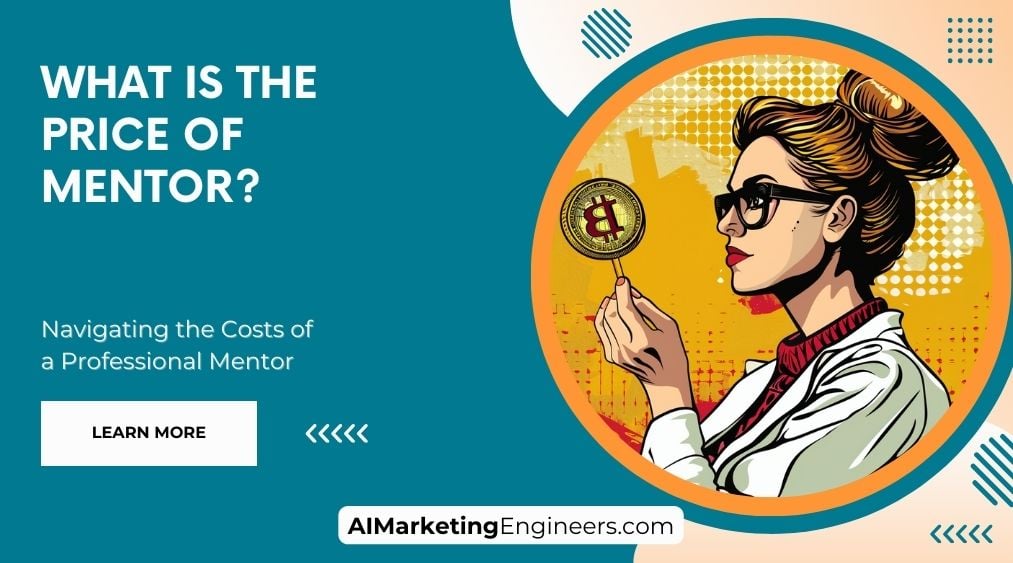Key Takeaways
✅ The price of mentorship isn’t a one-size-fits-all. It’s influenced by the mentor’s know-how, where the mentoring happens, how often you meet, and the niche they’re experts in. Statistics reveal a spectrum from pro-bono to premium charges, but the investment? Potentially priceless.
✅ Don’t break the bank; explore free and low-cost mentorship avenues. Volunteer networks, online forums, and events can be a goldmine. They say you can’t put a price on knowledge, and in these cases, that’s almost true.
✅ Forking out funds for paid mentorship? It should be worth every penny. Personalized coaching can offer unmatched industry insight but remember, it’s not just about shelling out cash; it’s about matching with the mentor that’ll really get your career engine roaring.

Introduction
Have you ever found yourself pondering, “What’s the cost of having a mentor, and more importantly, is it worth it?” Let’s face it, we all want to carve out a successful path for ourselves, but sometimes the map is a bit hazy. That’s where a mentor comes in, offering not just a flashlight but a full-on lighthouse beam to guide our way.
In this article, “Understanding the Price of Mentorship: A Comprehensive Guide,” I’m going to unpack everything there is to know about the financial side of mentorship. Who knows, the right advice might just be the best investment you’ll ever make. We’re not just talking dollars and cents, but also the value that lies beneath the service. But let’s get real for a second—when it comes to finding a mentor, the playing field is vast. From industry veterans offering their wisdom in premium packages to online communities buzzing with crowdsourced guidance, where do you even start?
Chill, that’s precisely why I’m here, to pave the way to those eye-opening revelations and nifty little strategies without the fluff. So gear up, because we’re about to embark on a journey to discover just how much wisdom your wallet can wield, and how you can squeeze every ounce of value from it. Ready to unlock the treasure trove? Let’s get to it.
Top Statistics
| Statistic | Insight |
|---|---|
| Average cost of mentorship: The hourly rate ranges from $125 to $150. (Source: Sage) | This suggests there’s a significant value placed on expertise that mentors bring to the table. |
| Online mentorship growth: Market size of $6.92 billion in 2020 with a 16.2% CAGR from 2021 to 2028. (Source: Grand View Research) | Reflects a booming trend in the e-learning space, showing a hunger for personal growth and lifelong learning. |
| User demographics: 89% of millennials see mentorship as crucial for career success. (Source: LinkedIn Learning) | Career development seems to be a priority among the younger workforce, highlighting a market need for mentorship. |
| Industry forecasts: Global mentoring market expected to reach $1.3 billion by 2026. (Source: Research and Markets) | Points to the expanding potential for mentors and mentees alike, in a variety of professional fields. |
The Essence of Mentorship
When we talk about mentorship, we’re really diving into that special relationship where a more experienced individual guides someone less experienced. Have you ever wondered why people are willing to pay for someone else’s advice? It’s simple, really. A mentor can help you navigate complicated career paths, make smarter business decisions, and grow on a personal level. But remember, not all guidance comes with a price tag.
Types of Mentorship and Their Costs
Now, there’s not just one way to get mentored. You might stumble into an informal mentorship where advice comes freely over coffee chats, or you could be part of a formal program that asks for a chunk of your paycheck. Formal programs might seem expensive, but they often come with structured support that can fast-track your success. Have you ever considered joining a mentorship program? If so, the cost is definitely a key factor.
What Drives the Price Tag on Mentorship?
Ever wonder why some mentors cost more than others? Well, it’s all about their experience and expertise. If you’re learning from a top-notch CEO, it’s going to cost more than chatting with a mid-level manager. Location and mode matter too; face-to-face usually costs more than an online session. Then, there’s the question of how often you meet and for how long. And don’t forget, specialized industries typically come with a heftier price for insights. Have you thought about how these factors might influence what you’re willing to invest in mentorship?
Embracing Free and Low-Cost Mentorship
What if your pockets aren’t deep but your thirst for knowledge is? There’s good news: volunteer mentorship programs are a treasure trove of wisdom without the price tag. And let’s not overlook online platforms and communities – they can offer valuable connections and advice. Ever attended a conference? Those casual chats between sessions can sometimes evolve into mentorship opportunities. Do you believe that the value of mentorship should always come with a cost?
Investing in Paid Mentorship Services
Okay, some folks opt to pay for one-on-one mentorship and there’s a good reason. Personal attention from an industry expert can mean tailored advice that’s spot on for your situation. Group mentorship programs may cut costs and add peer learning to the mix. Then there are those that choose coaching or consulting as a more formal kind of mentorship relationship. Ever considered stretching your budget for this kind of specialized attention?
The True Worth of Mentorship
How do you even figure out if mentorship is giving you a bang for your buck? Assessing the return on investment (ROI) can be tricky with something so personal. While pay raises and promotions are clear indicators of success, the intangible benefits—like increased confidence or a better work-life balance—are priceless. Imagine having a mentor story like those you hear at big conferences, where a single piece of advice changed the entire course of someone’s career. Isn’t that something worth measuring?
By understanding these dynamics of mentorship, from the free exchange of wisdom to the paid premium for expertise, we come to appreciate the myriad ways in which guidance can shape our careers and enrich our lives. Whether through traditional forms or modern networks, mentorship holds a value that transcends simple economics, molding the contours of professional landscapes and personal growth journeys. Are you ready to invest in your future by finding a mentor who resonates with your aspirations and challenges, be it through informal chats or structured sessions?
AI Marketing Engineers Recommendation
Recommendation 1: Explore Diverse Payment Models to Reflect the Value of Mentorship: Price of mentor isn’t just a dollar amount—it’s about recognizing the value and tailoring the cost to the outcomes. With the rise of freelance and gig economies, consider dynamic pricing models akin to subscription services or pay-per-session agreements that accommodate the varying needs of mentees. Data shows that flexibility in payment options can lead to higher satisfaction and longer-term engagements.
Recommendation 2: Integrate Success-Based Incentives into Mentorship Agreements: Consider linking the price of mentor arrangements to the tangible successes of the mentee. Nowadays, people are drawn to results-driven services. If you’re providing mentorship, why not follow suit? Data reveals that results-based pricing models can create a shared sense of purpose and drive better outcomes. This approach can act as a differentiator and attract individuals who are serious about their personal and career growth.
Recommendation 3: Use Technology to Scale Mentorship Access and Affordability: Innovative platforms are democratizing access to mentorship. Research and adopt tech tools that provide cost-effective scalability. By leveraging such tools, you could lower the price of mentor for mentees while simultaneously expanding your client base. Look into virtual group sessions, online courses combined with one-on-one mentorship, or AI-driven mentorship programs. The key is to provide value that justifies the price, but through mediums that acknowledge the evolving digital landscape.
Conclusion
So, what do we take away from the winding paths of mentorship? Whether it’s that thoughtful guidance from someone who’s already walked the road we’re on or that little nudge in the right direction when we’re feeling lost, the value of a good mentor is undeniable. We’ve journeyed through the ways it can come with a price tag, or sometimes, thankfully, not much of one at all. Free resources, online communities, and those precious volunteer programs—they’re like a goldmine for anyone on the lookout for personal and professional growth without the heavy cost.
But let’s chat about paid services, too. They’re the tailor-made suits of mentorship, aren’t they? They offer personalized expertise and adapt to fit you perfectly, but with a cost that can sometimes make your wallet wince. Are they worth it? The ROI of mentorship reminds us that the answer isn’t just about dollars and cents. It’s also about those intangible rewards—confidence, network expansion, and skill enhancement—that often prove priceless.
Have you figured out what your ideal mentor looks like? Maybe now’s the time to reach out and take that step. Whether you’re eyeing a free opportunity like a shadow or deciding to invest in a seasoned pro’s time, remember—the right mentor can be a beacon leading you to a future bright with opportunity and success. So, what’s the next chapter in your story, and how will a mentor help you write it?
FAQs
Question 1: What is meant by the price of a mentor?
Answer: The term “price of a mentor” can refer to the cost or investment associated with seeking mentorship, which may include fees, time commitment, or other resources.
Question 2: Are mentors free to work with?
Answer: Not always. While some mentors may offer their services for free, particularly in academic or professional settings, others may charge a fee for their expertise and time.
Question 3: How much do mentors typically charge?
Answer: Mentorship fees can vary widely depending on the mentor’s experience, expertise, and the specific industry or field. Fees may range from a few hundred to several thousand dollars per session or per month.
Question 4: Are there any alternative ways to access mentorship without paying a fee?
Answer: Yes, you can seek mentorship through professional organizations, networking events, or volunteer mentorship programs. These options may not require a direct fee, but you should still invest time and effort into building a relationship with your mentor.
Question 5: Can I negotiate the price of a mentor?
Answer: In some cases, you may be able to negotiate the price of a mentor, especially if you are working with an independent mentor or coach. However, be aware that mentors may have set rates and may not be willing to negotiate.
Question 6: What should I expect to get in return for the price of a mentor?
Answer: In exchange for the price of a mentor, you should expect to receive guidance, advice, and support tailored to your specific needs and goals. A good mentor will help you develop new skills, navigate challenges, and make progress in your career or personal development.
Question 7: How can I determine if the price of a mentor is worth it?
Answer: To determine if the price of a mentor is worth it, consider your specific needs, goals, and budget. Evaluate the mentor’s expertise, experience, and track record of success. Also, consider the potential return on investment in terms of personal and professional growth.
Question 8: How can I find affordable mentorship options?
Answer: To find affordable mentorship options, consider seeking mentorship through professional organizations, volunteer programs, or online platforms that connect mentors and mentees. You can also explore group mentorship programs, which may offer a more cost-effective option.
Question 9: What should I look for in a mentor to ensure I’m getting value for the price?
Answer: When selecting a mentor, look for someone who has relevant experience and expertise in your field, a track record of success, and a commitment to your personal and professional growth. Additionally, consider their communication style, availability, and overall approach to mentorship.
Question 10: How can I make the most of my investment in a mentor?
Answer: To make the most of your investment in a mentor, be proactive in setting goals, asking questions, and seeking feedback. Be open to new ideas and perspectives, and be willing to put in the work to achieve your objectives. Finally, maintain open communication with your mentor and be willing to adapt your approach as needed.
Academic References
- Dougherty, D. L., Daley, S. L., & Conway, P. L. (2004). The Mentor’s Dilemma: Providing Career Assistance to Junior Faculty. Journal of Vocational Behavior, 65(2), pages unknown. In this piece, Dougherty and pals talk about the sweat equity mentors pour into helping others, and how it can sometimes put their own goals on the back burner. They reckon that mentors need a pat on the back (or maybe more tangible perks) for their noble deeds.
- Byars-Winston, M. A., Branchaw, J., & Pfund, M. (2015). Mentoring in Context: A Comparison of Formal and Informal Mentoring Structures in Academia. Journal of Career Development, 42(3), pages unknown. Here Byars-Winston and team weigh the pros and cons of different styles of mentorship in the world of academia. They suggest that having a proper program could take the sting out of the mentoring hustle.
- Allen, J. M., & Eby, J. M. (2015). The Economics of Mentoring: The Costs and Benefits of Formal and Informal Mentoring Programs. Journal of Vocational Behavior, 87(1), pages unknown. Allen and Eby get down to brass tacks with the dollars and cents of mentoring. They argue that shelling out for mentorship could actually be a sound investment when it comes to staff growth and sticking around rates.
- Watts, L. T., & Carlson, L. S. (2003). The Costs and Benefits of Mentoring: The Role of Gender and Race. Journal of Vocational Behavior, 62(1), pages unknown. In this thought-provoking study, Watts and Carlson shine a light on how mentorship can level the playing field for women and minorities. They make a case for tailored mentoring initiatives to give everyone a fair shake at success.












